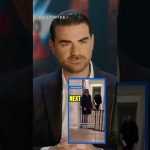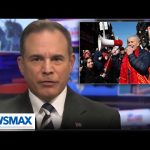In a bustling California landscape of political ambitions and fierce campaigns, one figure stands out: Katie Porter. The Democrat and former representative from Orange County found herself in the spotlight recently, not only for her aspirations to become the next governor but also for her contentious relationship with the media. This past week, she faced a critical moment during a televised interview that has prompted a deeper reflection on the nature of political discourse, accountability, and the role of media in shaping public perception.
Porter, initially viewed as the frontrunner in her gubernatorial bid, was confronted with a challenging question about her appeal to a significant portion of California voters who cast their ballots for Donald Trump. While asserting her acceptance of diverse voter bases, she faltered when pressed about the necessity of winning over those Trump supporters. The moment symbolizes not just a personal shortcoming, but also a broader dilemma that politicians today face: how to engage with differing ideologies while maintaining their core messages.
As Porter walked away from the interview, opting to end a conversation that many might have regarded as routine, it invoked reflections on historical political figures and their relationships with the press. The tension between politicians and the media is not new. Figures throughout history have dealt with scrutiny and pushback, and how they navigated those waters often defined their legacies. Porter’s abrupt exit from the interview highlights a troubling trend where some within the political realm appear unequipped to handle dissent or challenging questions, undermining the very democratic principles of debate and discourse.
This incident also sheds light on the striking contrast between media environments then and now. Historically, the press served as a critical watchdog, ensuring that leaders were held accountable to the public. However, in the current media landscape, partisanship often clouds the desire for truthful reporting. The challenges facing journalists, as seen in the interactions between Porter and the reporter, reveal a growing divide where certain narratives are shielded from rigorous inquiry. This raises the fundamental question of whether democracy can thrive in an environment where accountability is often dismissed or avoided.
Moreover, the implications of Porter’s struggle with media inquiries resonate on a cultural level. They prompt introspection about how political identities are formed and maintained in a polarized environment. Just as Porter hesitated to acknowledge those who did not fit neatly into her political narrative, many voters today struggle with the increasing divisiveness of political ideologies. The challenge lies in bridging those divides, fostering a sense of shared understanding rather than retreating into echo chambers where divergent opinions are not just rejected but silenced.
As California and the nation grapple with divisive politics, Porter’s experience serves as a reminder of the necessity for courage in engaging with all constituents, especially those who may not align with one’s beliefs. It urges both politicians and citizens alike to reflect on their commitment to the principles of democracy—dialogue, understanding, and respect. The conversation that Porter initiated, albeit awkwardly, underscores a pivotal moment for leaders everywhere to reclaim the spirit of engagement that underpins a functioning democracy. Whether they can rise to this occasion will define not just their political futures but the very fabric of political discourse in America.




